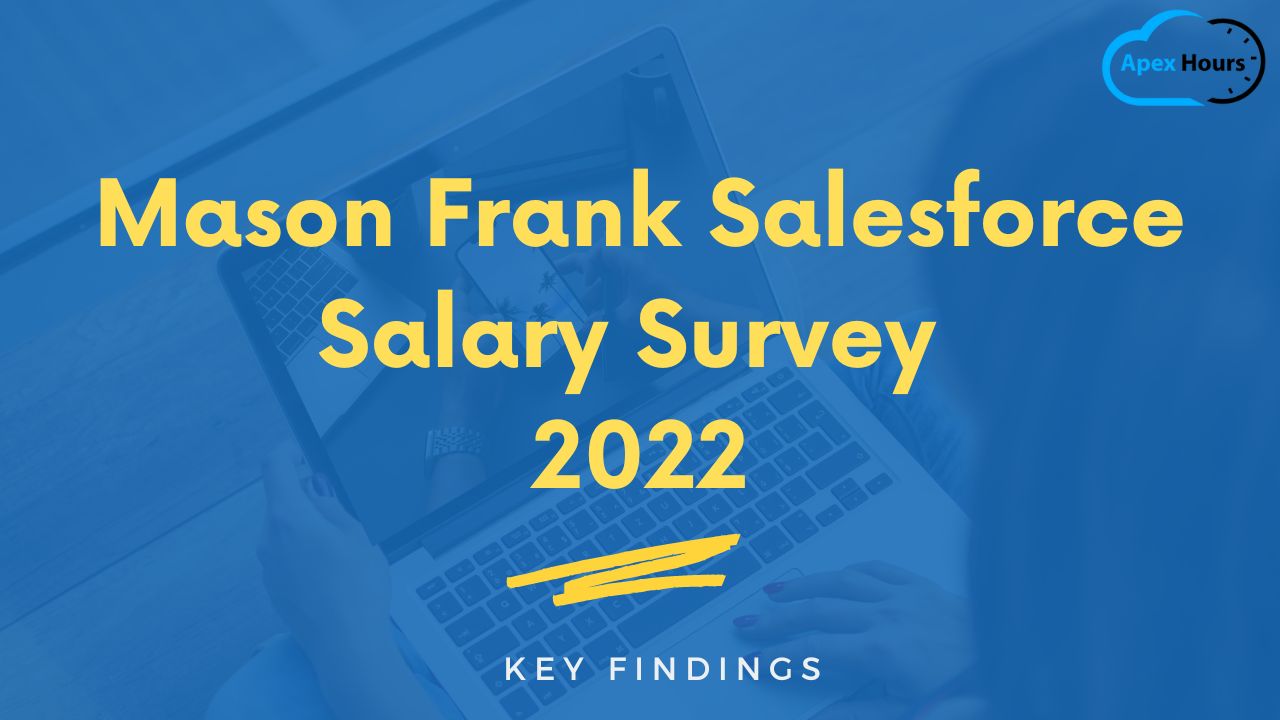Things can change quickly in a fast-moving ecosystem like Salesforce. That’s why it’s crucial to stay up to date with the latest developments, not just with the technology itself, but also with the community and wider industry. Since 2015, Mason Frank International’s annual Salesforce Salary Survey for Salesforce professionals has been the Salesforce community’s go-to resource on all things recruitment related. Let see the Mason Frank Salesforce Salary Survey 2022 key finding.
Our latest Salesforce Careers and Hiring Guide revealed some interesting data points. Let’s take a
look at a few of the key findings from Mason Frank Salesforce Salary Survey 2022 and Salesforce Salary guide and what they mean for the Salesforce ecosystem.
Mason Frank Salesforce Salary Survey 2022 Key finding
Here is the key finding of the Mason Frank Salesforce Salary Survey 2022.
#1. Only 53% of Salesforce employees believe their employer is providing equal pay for equal work
If we want to bridge the skills gap and bring a more diverse group of professionals into the Salesforce ecosystem, we need to make sure our industry is inclusive and equitable. That means eliminating gender pay gaps and compensating people equally based on their skills, not on who they are.
Just over half of the Salesforce professionals we surveyed said they believed their employer paid all staff the same wage for the same work. That means almost half of our participants believed there was some pay discrepancy in their workplace.

If businesses want to attract great talent, they need to be committed to walking the walk when it comes to equality. Today’s professionals want to work for companies that do the right thing—that treat their employees equally and fairly.
Transparency is key here. Publishing pay data on a regular basis builds trust among your employees and your customers. Even if it’s not perfect, it’s important that you’re open about it and that you can show that you’re working on improving things in your organization.
#2. 76% of Salesforce professionals who work remotely would reconsider working for their employer if they weren’t offered flexibility
Once reserved for a select few (mostly tech workers), remote work has rocketed to greater acceptance in the past couple of years. However, as we learn to live with Covid-19, many businesses have reopened their offices and invited employees to return, whether full- or part-time. Many businesses that rolled out remote and flexible work policies during the pandemic are now stripping them back; but are employees ready to return?

More people than ever have now experienced the benefits of working from home first-hand, and while it may not be everyone’s first choice, those who prefer it are reluctant to give it up. We found that more than three-quarters (76%) of Salesforce professionals who currently work remotely would consider leaving their employer if they weren’t offered that flexibility.
Though it may be tempting for some employers to revert back to old working models, it’s important to remember that the way we work has changed—and the best talent isn’t just looking for the biggest paycheck. Top professionals want trust, flexibility, and autonomy from their employers, and in a candidates’ market, those who can offer those things will put themselves at the front of the line for Salesforce talent.
#3. 62% of Salesforce professionals do not believe you need a degree to work with Salesforce
As our world has become increasingly digitized, and technology has been made more accessible, the barrier to entry in the tech jobs market has dropped. The rise of cloud technology has created more opportunity—and greater demand—for tech talent to fill newly spawned job roles in the field. Still, given the technical nature of many Salesforce positions, it might surprise you to learn that 62% of respondents to our survey don’t think you need a degree to work with the platform. While some respondents cited a degree’s ability to teach problem-solving and critical thinking skills, and to demonstrate a personal commitment to learning, a majority agreed that not having a degree was not an obstacle to a career in Salesforce.

Why? Among the primary reasons cited is the massive amount of Salesforce training resources available to students of the product. Thanks to Trailhead, certification training, and a huge network of generous and helpful Salesforce MVPs, anyone can learn Salesforce skills in their own time, at their own pace. A willingness to learn new things and build real-world experience was ranked as being more important to success in Salesforce than an academic background.
This growing acceptance of self-taught techies, and welcoming of professionals from non-traditional backgrounds, is great news for Salesforce professionals and employers alike. Removing these unnecessary hurdles opens the door to more budding Salesforce mavens, and helps businesses hire the talent they need to support their Salesforce instances, or those of their customers. It also means that more people are able to access the colossal opportunity that the Salesforce ecosystem offers as it continues to expand.
#4. Burnout affects 44% of Salesforce professionals
Burnout is yet another consequence of the tech skills gap. Demand for Salesforce support is on the rise, but with the supply of new talent slow to catch up, it’s those already working in the industry who are left to shoulder the burden. Longer hours, higher stress, and an erosion of work-life balance all lead to professionals feeling like they’ve got nothing left in the tank.

Almost half (44%) of permanent Salesforce professionals told us they’ve experienced burnout in their current role. That’s a lot of talent at risk of leaving their roles, or worse still, exiting the tech industry altogether. We can’t afford to lose the professionals we have. And with the Salesforce economy set to grow exponentially over the next few years, businesses need to put measures in place now to combat these high levels of burnout and ensure that their professionals aren’t being crushed under the weight of increasing demand.
That number was lower, though still startlingly high, in those working on a contract basis, with 32% of freelancers having experienced burnout. It’s possible that the additional control over workload and scheduling that contractors have contributes to lower rates of extreme stress—something it would be worth employers of permanent Salesforce professionals noting if they want to keep their talent.
#5. 78% of Salesforce professionals secured more money when switching employers
One of the most significant findings of our report is that Salesforce salaries are on the up; but many professionals have to switch jobs to see a higher paycheck. A hefty 78% of Salesforce professionals who have changed jobs in the past year received a salary increase with their new employer. On average, job hoppers saw their pay rise by 23%.

The shortage of talent in the Salesforce space is driving many employers to attempt to out-bid competitors to secure skilled candidates. This war for resources, in addition to issues like burnout, is contributing to tech’s higher-than-average turnover rate and causing a headache for businesses trying to hold on to talent.
Regular benchmarking against industry averages (using tools like our Careers and Hiring Guide) can reassure employees in feeling that they’re earning what they’re worth, before they jump ship to get it. But remember it’s not always about money; 15% of those who’ve changed jobs said their salary had stayed the same or even decreased, but they were motivated to make the move anyway because of better company culture, the offer of flexible working, or the ability to work remotely. Clearly, employers need to think outside their wallets when it comes to retaining their Salesforce talent.




